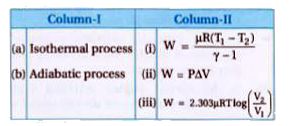An ideal gas at temperature T1 is compressed to 32th of its original volume, then its temperature T2 will be _____ (γ=1.4) Solution in Gujrati
For an adiabatic process,
T1Vγ−11=T2Vγ−12
∴T2=T1(V1V2)γ−1
=T1(V1V1/32)γ−1=T1(32)1.4−1
=T1×(25)2/5
=T1×4
=4T1
Topper's Solved these Questions
- THERMODYANMICS BOOK - KUMAR PRAKASHANCHAPTER - THERMODYANMICS EXERCISE - Section-C (Objective Questions (Match))
4 Videos
- THERMODYANMICS BOOK - KUMAR PRAKASHANCHAPTER - THERMODYANMICS EXERCISE - Section-C (Objective Questions (Assertion & Reason )
8 Videos
- THERMODYANMICS BOOK - KUMAR PRAKASHANCHAPTER - THERMODYANMICS EXERCISE - Section-C (Objective Questions (True & False ))
8 Videos
- THERMAL PROPERTIES OF MATTERBOOK - KUMAR PRAKASHANCHAPTER - THERMAL PROPERTIES OF MATTEREXERCISE - Question Paper (Section - D) (Answer following in brief :) Each carry 4 marks
1 Videos
- UNITS AND MEASUREMENTBOOK - KUMAR PRAKASHANCHAPTER - UNITS AND MEASUREMENTEXERCISE - Section -F (Questions from Module )
20 Videos
Similar Questions
In Column-I processes and in Column-II formulas of work are given. Match them appropriately :

View SolutionAssertion : Work and heat are two equivalent form of energy
Reason: Work is the transfer of mechanical energy irrespective of temperature difference, whereas heat is the transfer of thermal energy because of temperature difference only.
View SolutionProve that for an adiabatic process TVγ−1 = constant.
View SolutionIn an experiment on the specific heat of a metal, a 0.20 kg block of the metal at 150∘C is dropped in a copper calorimeter (of water equivalent 0.025 kg) containing 150 cm3 of water at 27∘C. The final temperature is 40∘C. Compute the specific heat of the metal. If heat losses to the surroundings are not negligible, is your answer greater or smaller than the actual value for specific heat of the metal ?
View SolutionIf the error in measurement of radius of a shpere is 2% then the error in determination of volume of the sphere will be …………
View SolutionAn ideal gas at 27^(@)C is compressed adiabatically to 8//27 of its original volume. If gamma = 5//3 , then the rise in temperature is
View SolutionA gas is suddenly compressed to 14th of its original volume. Caculate the rise in temperature when original temperature is 27∘C.γ=1.5.
View SolutionA gas of gamma=1.4 and initial temperature 0^(@)C is suddenly compressed to 1//5th its original volume. Calculate the rise in temperature.
View Solutionएक आदर्श गैस (γ=5/3) का ताप 27∘C है। इसे रुद्धोष्म संपीडित करने पर इसका आयतन , प्रारम्भिक आयतन का (8/27) रह जाता है। ताप में वृद्धि होगी :
View SolutionAn ideal gas at initial temperature 300 K is compressed adiabatically (γ=1.4) to (116)th of its initial volume. The gas is then expanded isobarically to double its volume. Then final temperature of gas round to nearest integer is:
View SolutionA gas is suddenly compressed to 1/4 th of its original volume at normal temperature. The increase in its temperature is
(Take, γ = 1.5).
View SolutionA gas is suddenly compressed to 1/4 th of its original volume. What is the rise in the temperature, if the original temperature of the gas being at 27°C and γ = 1.5 ?
View Solutionएक गैस को उसके मूल आयतन से 14 आयतन तक अचानक संपीड़ित किया जाता है। ताप में वृद्धि का आकलन कीजिये, मूल ताप 300K और γ = 1.5 है।
View SolutionA mass of dry air at N.T.P. is compressed to 132 th of its original volume suddenly. If γ=1.4 find the final pressure of the gas if initial pressure is P.
View SolutionAn ideal gas is compressed adiabatically to 1/4 th of its initial volume at 10^(@)C . Find out the final temperature of the gas [gamma = 1.4] .
View Solution
